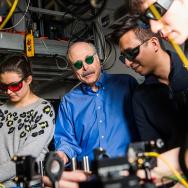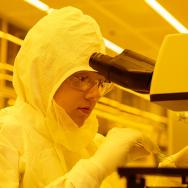The Chicago Quantum Exchange, a growing intellectual hub for the research and development of quantum technology, has added Northwestern University as its newest member.
Northwestern joins forces with the University of Chicago, the U.S. Department of Energy’s Argonne National Laboratory and Fermi National Accelerator Laboratory, the University of Illinois at Urbana-Champaign, and the University of Wisconsin-Madison in enhancing a national leading collaboration in the rapidly emerging field of quantum information.
The new partnership comes as Northwestern consolidates its strengths in quantum information science, a field that promises to transform communications, security, metrology, sensing, and computing. Northwestern’s new initiative, INQUIRE, brings together dozens of researchers in its leading programs, including chemistry, materials science & engineering, physics, and electrical & computer engineering to work on developing materials and methods that can propel the future of quantum science.
“Collaborative science is at the heart of Northwestern’s research success,” said Jay Walsh, vice president for research at Northwestern University. “By joining the Chicago Quantum Exchange, our researchers bring their knowledge, passion, and curiosity to a robust new research ecosystem, one that leverages the unique strengths of each institution, encouraging transformative discovery.”
The Chicago Quantum Exchange is anchored at the University of Chicago’s Institute for Molecular Engineering, and brings together more than 100 researchers in various areas of quantum information technology. Chicago Quantum Exchange researchers works toward advancing academic, industrial and governmental efforts in the science and engineering of quantum information, with the goal of applying research innovations to develop radically new types of devices, materials and computing techniques.
The continued expansion of the Chicago-based hub, which also announced a partnership with IBM Q last week, demonstrates the depth of expertise in quantum technology in the Chicago area and the Midwest and can help continue to attract industry partnerships and government funding for quantum research and facilities.
Northwestern brings to CQE institutional expertise in secure quantum communications and materials. Northwestern researchers are designing new ways to create quantum materials more quickly and economically and are producing novel materials to create large-area qubit arrays with the potential to operate up to room temperature — a breakthrough that could revolutionize quantum computing and information processing.
“The inclusion of Northwestern within the Chicago Quantum Exchange expands our collective research and expertise in key areas of science and technology,” said David Awschalom, director of the Chicago Quantum Exchange, Liew Family Professor in Molecular Engineering at UChicago, and an Argonne senior scientist. “We’re thrilled to be bringing on board leading researchers who are helping accelerate discoveries in secure communications and quantum materials, and will ultimately help strengthen one of the largest quantum research efforts in the U.S.”
As the quantum information science field continues to grow, so will the demand for quantum engineers and scientists in industry, government, and at universities. The Chicago Quantum Exchange, through its member institutions, addresses this growing demand. UChicago, Illinois and UW-Madison all provide undergraduate and graduate students access to world-class expertise and research facilities in quantum science and engineering. Collectively, these institutions are well positioned to strategically develop new curricula and programs to train tomorrow’s quantum information science workforce. The Chicago Quantum Exchange, through the new IBM partnership, will also provide postdoctoral training options, including up to five new positions for postdoctoral researchers.
Northwestern will further these rich educational opportunities by providing curricula and programs for training undergraduate and graduate students.
“INQUIRE has a significant focus on interdisciplinary education and outreach. The joint doctoral program in applied physics brings together faculty members from six departments across the McCormick School of Engineering and the Weinberg College of Arts and Sciences, and we have well-established opportunities for undergraduate students and teachers to help train tomorrow’s scientists and engineers,” said Fruma Yehiely, associate vice president for research at Northwestern, who helped to spearhead INQUIRE.
The Chicago Quantum Exchange is the latest in a long history of scientific collaborations between Northwestern and core member institutions, including UChicago and the U.S. Department of Energy’s Argonne and Fermilab. From 1989 to 2000, Illinois, UChicago, Northwestern, and Argonne formed one of the first National Science Foundation Centers for Science and Technology, collaborating on superconductivity, research that underpins some of today’s research in quantum information science. Most recently, Northwestern Professor Prem Kumar, known for his pioneering work on quantum networks and communications, has been working with Fermilab on related quantum research and demonstrations.
Several significant collaborations between the University of Chicago and Northwestern also focus on materials science and nanotechnology research. The Center for Hierarchical Materials Design (ChiMaD), co-directed by Northwestern’s Peter Vorhees and Greg Olson and UChicago’s Juan de Pablo, provides an example of such a collaboration at the frontiers of materials science, molecular engineering, and data sciences. Argonne and Northwestern collaborate in areas including energy, batteries, solar technologies, biological and environmental systems, data science and computation, materials, and national security.
“Multi-stakeholder collaborations, such as the institutions that come together to form the Chicago Quantum Exchange, bring together top intellectual talent from our universities, national laboratories and industry to advance discovery,” said Juan de Pablo, Vice President for National Laboratories at the University of Chicago. “This is critical for developing both the applications that can change the world and the workforce that will continue to build on them.”

